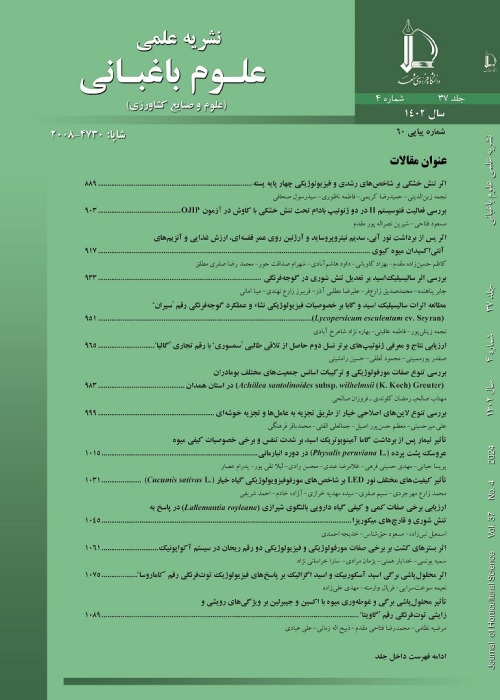Reaction of Sweet Basil (Ocimum bacilicum L.) to Different Fertilizing System in an Agroecosystem
The tendency to produce aromatic and medicinal plants and the demand for natural products is increasing especially in the world. Ecological agriculture (Agroecology) of medicinal plants guarantees their quality and reduces the possibility of negative effects on their quality and yield. Evaluation of different plant nutrition systems is one of the most important principles in the production planning of medicinal plants in order to achieve high yield and quality of effective ingredients. Proper fertilizer management is one of the most important factors in agricultural production. Identification of fertilizers which are compatible with nature and are suitable for plant growth could have favorable effects on quantitative and qualitative indices of the plant. Organic fertilizers are genuine and risk-free products that could be suitable for agricultural sustainability. Soil organic matter improves fertility and water retention, provides proper ventilation, long-term storage of plant nutrients and microorganisms, so replacing chemical fertilizers with fertilizers such as vermicompost and biofertilizer can reduce the above-mentioned effects. Biofertilizers are one of the operations that is nowadays in accordance with the principles of sustainable agriculture for soil fertility. Biofertilizers include the compost of one or more types of useful soil organisms or as metabolic by-products of these organisms that are used to provide the plant with the nutrients it needs in an agroecosystem.
In order to investigate the effect of biochar, organic and biological fertilizers on the quantity and quality of Ocimum bacilicum L., a factorial experiment was done in a randomized complete block design with three replications. Experimental treatments included two levels of biochar (0 and 20 ton ha-1) and five levels of fertilizers (vermicompost (10 ton ha-1), Mycorrhiza, Azotobacter, Pseudomonas and no fertilizer application). Prior to planting sweet basil seed, biofertilizers and vermicompost were mixed with soil to the depth of 15 cm. Mycorrhizal fungi were mixed with seed. Azotobacter and Pseudomonas bacteria were also incubated with seeds (seed inoculated). It should be added that in this study no chemicals were used to control weeds and pests.
According to the results, the highest plant height and number of main branches were obtained in biochar application with vermicompost (49.37 cm and 7, respectively), which was significantly better than other treatments. The interaction effect of biochar and fertilizer had a significant effect on fresh and dry weight of leaf and stem. Mean comparison of treatments showed that the highest leaf and stem fresh weight were obtained in biochar + Pseudomonas application (792 and 876 g m-2, respectively), which had no significant difference with biochar + vermicompost; and also, the maximum leaf dry weight and stem dry weight were obtained in biochar with Pseudomonas application (166 and 175 g m-2, respectively). The interaction between biochar and fertilizer on phenol, flavonoids and antioxidant activity of basil showed a significant differences between treatments.
In general, the results showed that the use of biochar and biological and organic fertilizers could be effective in both the quality and quantity of sweet bail, where, the use of the bacterium Azobacter and Pseudomonas with biochar had the greatest effect on the quality and quantity of sweet bail. Finally, it could be concluded that the combined use of biochar with biological fertilizers had significant impacts on the quantitative and qualitative traits of sweet bail in ecological or low input agricultural.
- حق عضویت دریافتی صرف حمایت از نشریات عضو و نگهداری، تکمیل و توسعه مگیران میشود.
- پرداخت حق اشتراک و دانلود مقالات اجازه بازنشر آن در سایر رسانههای چاپی و دیجیتال را به کاربر نمیدهد.


